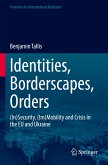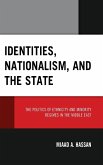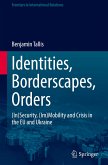Examines the changing character of political identities, affiliations, and allegiances in the contemporary world.
Where do political identities come from, how do they change over time, and what is their impact on political life? This book explores these and related questions in a globalizing world where the nation state is being transformed, definitions of citizenship are evolving in unprecedented ways, and people's interests and identities are taking on new local, regional, transnational, cosmopolitan, and even imperial configurations. Pre-eminent scholars examine the changing character of identities, affiliations, and allegiances in a variety of contexts: the evolving character of the European Union and its member countries, the Balkans and other new democracies of the post-1989 world, and debates about citizenship and cultural identity in the modern West. These essays are essential reading for anyone interested in the political and intellectual ferment that surrounds debates about political membership and attachment, and will be of interest to students and scholars in the social sciences, humanities, and law.
Review quote:
'Political membership centered in nation-states is making room for other affiliations and allegiances. These are shaping novel assemblages of interests and identities with local, regional, transnational, and even imperial geographies. Can these become stable meanings and gain the power historically associated with national citizenship? The essays in this extraordinary collection map complexities rather than easy answers. They leave few established propositions untouched.'
Saskia Sassen, Ralph Lewis Professor of Sociology, University of Chicago and author of Territory, Authority, Rights: From Medieval to Global Assemblages (2006)
'Identities, affiliations and allegiances ignite passions - especially when the borders they define - territorial or otherwise - are transgressed. Their analysis, when done well, ignites similar passions in the battle fields of academia where identities, affiliations and allegiances are as entrenched and uncomfortably account for normative and cognitive boundaries. This volume, rich and provocative, will ignite strong passions.'
J. H. H Weiler, University Professor and Director of the Global Law School, New York University
'An exemplary demonstration of the creative benefits of collaboration between normative theorists and social scientists on a vital subject of growing concern world-wide. Its special strength is to lift issues of citizenship, immigration and ethnicity out of their specialized niches and reconsider them in the context of what one of the contributors properly characterizes as a 'PostWestphalian World.' Deserving a wide readership in philosophy, political science, sociology, and international affairs, this book will undoubtedly stimulate a reconceptualization of the entire field.'
Aristide R. Zolberg, Walter P. Eberstadt Professor of Political Science, New School for Social Research
Table of contents:
Introduction Seyla Benhabib, Ian Shapiro and Danilo Petranovich; Part I. Emergence and Limits of National Political Identities: 1. From affiliation to affinity: citizenship in the transition from empire to the nation-state Faruk Birtek; 2. Transnationalizing the public sphere: on the legitimacy and efficacy of public opinion in a postwestphalian world Nancy Fraser; 3. 'Being there': place, territory, and identity Charles Maier; 4. Political boundaries in a multilevel democracy Rainer Bauböck; Part II. Multiple Identities in Practice: The European Example: 5. Building European institutions: beyond strong ties and weak commitments Veit Bader; 6. Soft borders and transnational citizens Julie Mostov; 7. Transnational nationalism: redefining nation and territory Riva Kastoryano; Part III. Decoupling Citizenship from Identity: 8. Binding problems, boundary problems: the trouble with 'democratic citizenship' Clarissa Hayward; 9. Immigrant political integration and ethnic civic communities in Amsterdam Jean Tillie and Boris Slijper; 10. Nonterritorial boundaries of citizenship Melissa Williams, 11. Against birthright privilege: re-defining citizenship as property Ayelet Shachar; Part IV. Identity and Historical Injustice: 12. Social solidarity as a problem for cosmopolitan democracy Craig Calhoun; 13. The continuing significance of ethnocultural identity Jorge Valadez; 14. Amnesty or impunity? A preliminary critique of the report of the Truth and Reconciliation Commission of South Africa Mahmood Mamdani; 15. Law's races Rogers Smith.
Hinweis: Dieser Artikel kann nur an eine deutsche Lieferadresse ausgeliefert werden.
Where do political identities come from, how do they change over time, and what is their impact on political life? This book explores these and related questions in a globalizing world where the nation state is being transformed, definitions of citizenship are evolving in unprecedented ways, and people's interests and identities are taking on new local, regional, transnational, cosmopolitan, and even imperial configurations. Pre-eminent scholars examine the changing character of identities, affiliations, and allegiances in a variety of contexts: the evolving character of the European Union and its member countries, the Balkans and other new democracies of the post-1989 world, and debates about citizenship and cultural identity in the modern West. These essays are essential reading for anyone interested in the political and intellectual ferment that surrounds debates about political membership and attachment, and will be of interest to students and scholars in the social sciences, humanities, and law.
Review quote:
'Political membership centered in nation-states is making room for other affiliations and allegiances. These are shaping novel assemblages of interests and identities with local, regional, transnational, and even imperial geographies. Can these become stable meanings and gain the power historically associated with national citizenship? The essays in this extraordinary collection map complexities rather than easy answers. They leave few established propositions untouched.'
Saskia Sassen, Ralph Lewis Professor of Sociology, University of Chicago and author of Territory, Authority, Rights: From Medieval to Global Assemblages (2006)
'Identities, affiliations and allegiances ignite passions - especially when the borders they define - territorial or otherwise - are transgressed. Their analysis, when done well, ignites similar passions in the battle fields of academia where identities, affiliations and allegiances are as entrenched and uncomfortably account for normative and cognitive boundaries. This volume, rich and provocative, will ignite strong passions.'
J. H. H Weiler, University Professor and Director of the Global Law School, New York University
'An exemplary demonstration of the creative benefits of collaboration between normative theorists and social scientists on a vital subject of growing concern world-wide. Its special strength is to lift issues of citizenship, immigration and ethnicity out of their specialized niches and reconsider them in the context of what one of the contributors properly characterizes as a 'PostWestphalian World.' Deserving a wide readership in philosophy, political science, sociology, and international affairs, this book will undoubtedly stimulate a reconceptualization of the entire field.'
Aristide R. Zolberg, Walter P. Eberstadt Professor of Political Science, New School for Social Research
Table of contents:
Introduction Seyla Benhabib, Ian Shapiro and Danilo Petranovich; Part I. Emergence and Limits of National Political Identities: 1. From affiliation to affinity: citizenship in the transition from empire to the nation-state Faruk Birtek; 2. Transnationalizing the public sphere: on the legitimacy and efficacy of public opinion in a postwestphalian world Nancy Fraser; 3. 'Being there': place, territory, and identity Charles Maier; 4. Political boundaries in a multilevel democracy Rainer Bauböck; Part II. Multiple Identities in Practice: The European Example: 5. Building European institutions: beyond strong ties and weak commitments Veit Bader; 6. Soft borders and transnational citizens Julie Mostov; 7. Transnational nationalism: redefining nation and territory Riva Kastoryano; Part III. Decoupling Citizenship from Identity: 8. Binding problems, boundary problems: the trouble with 'democratic citizenship' Clarissa Hayward; 9. Immigrant political integration and ethnic civic communities in Amsterdam Jean Tillie and Boris Slijper; 10. Nonterritorial boundaries of citizenship Melissa Williams, 11. Against birthright privilege: re-defining citizenship as property Ayelet Shachar; Part IV. Identity and Historical Injustice: 12. Social solidarity as a problem for cosmopolitan democracy Craig Calhoun; 13. The continuing significance of ethnocultural identity Jorge Valadez; 14. Amnesty or impunity? A preliminary critique of the report of the Truth and Reconciliation Commission of South Africa Mahmood Mamdani; 15. Law's races Rogers Smith.
Hinweis: Dieser Artikel kann nur an eine deutsche Lieferadresse ausgeliefert werden.
'An exemplary demonstration of the creative benefits of collaboration between normative theorists and social scientists on a vital subject of growing concern world-wide. Its special strength is to lift issues of citizenship, immigration and ethnicity out of their specialized niches and reconsider them in the context of what one of the contributors properly characterizes as a ‘PostWestphalian World.’ Deserving a wide readership in philosophy, political science, sociology, and international affairs, this book will undoubtedly stimulate a reconceptualization of the entire field.' Aristide R. Zolberg, Walter P. Eberstadt Professor of Political Science, New School for Social Research








